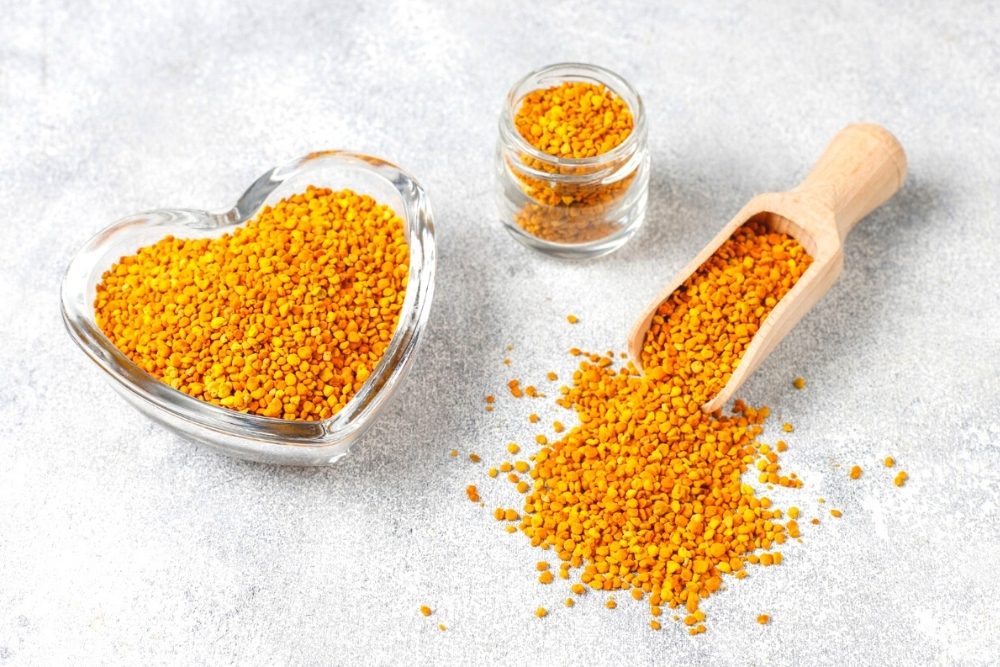The busy bee provides us with three superfoods that we can enjoy in both food and supplement form: bee propolis, bee pollen, and royal jelly. Let’s learn how these are different and take a closer look at the health benefits of bee pollen.
BEE-autiful Gifts for Health
Of the many gifts we receive from the bee, royal jelly is possibly the most familiar to people.
Royal jelly is a substance produced by worker honey bees. If fed to an ordinary female bee in the larval stage, royal jelly will transform her into the queen bee. The queen then goes on to outlive other worker bees, including those who fed her, by five or more years. How’s that for a “magical elixir?” Royal jelly contains a mix of protein, fat, sugars, vitamins, and minerals. Royal jelly has had many uses in folk medicine (as a skin and hair tonic) and has received some attention in modern research for its antimicrobial properties.
Bee propolis is sometimes referred to as “bee glue” as it is used to construct, seal and repair the beehive. Propolis is a resinous substance that bees collect from various plants. Propolis contains many vitamins, minerals, amino acids, and other plant compounds that give it antibacterial and antifungal power. In modern research, propolis has been found to prevent the growth of bacteria that causes dental cavities.
Nutrients found in Bee Pollen
Bee pollen is truly a superfood and, as you may have guessed, it is derived from the pollen that bees collect as they buzz about from flower to flower. Bee pollen contains many amazing components:
- Essential amino acids (Up to seven times the amount found in the same weight of traditional high protein foods)
- Vitamins A, D, E, K, C, and several of the B vitamins (particularly B5 and niacin)
- Bioflavonoids
What are the uses of Bee Pollen?
Bee pollen has been used as an anti-aging food and an energy supplement. It has been used to support the health of the adrenal glands which are most affected by stress. The antioxidants in bee pollen (vitamins A and C, for example) help protect our cells from damage caused by free radicals, a primary culprit in both the aging process and the onset of chronic disease.
The health protective benefits of bee pollen make it an excellent addition to your diet. Bee pollen comes in many different forms. You can sprinkle it onto foods such as salad, cereal, or yogurt. It can also be provided in capsule form. Since bee pollen is derived from bees and from plant sources, there is potential for an allergic reaction. Always check with your holistic health provider before taking any nutritional supplements.
Resources
Bruno, G. “Bee Pollen, Propolis, and Royal Jelly.” Smart Supplementation Series. (2005) Huntington College of Health Sciences Literature Education Series On Dietary Supplements. Accessed on 10 Feb 2022. https://www.huhs.edu/literature/Bee_%20Pollen-Propolis-and-Royal_Jelly.pdf
Komosinska-Vassev, K., et al. “Bee pollen: chemical composition and therapeutic application.” Evidence-based complementary and alternative medicine: eCAM vol. 2015 (2015): 297425. doi:10.1155/2015/297425 https://www.ncbi.nlm.nih.gov/pmc/articles/PMC4377380/
University of Rochester Medical Center Health Encyclopedia. “Bee Pollen.” Accessed on 10 Feb 2022. https://www.urmc.rochester.edu/encyclopedia/content.aspx?contenttypeid=19&contentid=BeePollen

